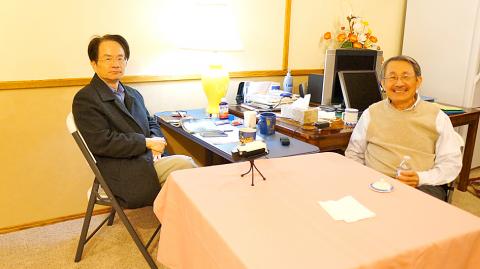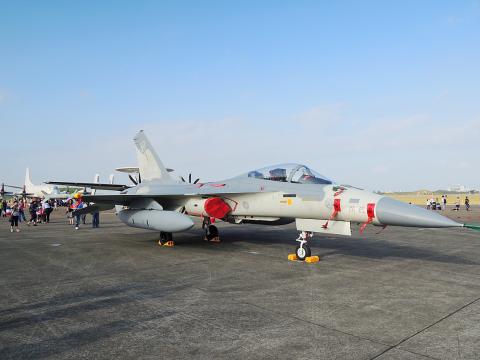Taiwan had plans to load miniaturized nuclear weapons into auxiliary fuel tanks of Indigenous Defense Fighter (IDF) jets to attack China, said Chang Hsien-yi (張憲義), who was the deputy director of the First Institute of the Chungshan Institute of Science and Technology (CSIST) and who defected to the US in 1988.
Due to the growing military threat from China, Taiwan during the 1980s conducted numerous military projects, including the research and development of mid-range surface-to-surface ballistic missiles, a nuclear weapons research project and the IDF project, Chang was quoted as saying in a new book that was based on an interview by Academia Sinica associate research fellow Chen Yi-shen (陳儀深), who last year went to the US to interview Chang.
Chang, a former colonel, said that the CSIST planned to use the IDF as a bomber because it was developed by Taiwan and its range could be fine-tuned without consulting other nations.

Photo provided by Walkers Cultural Publisher
“We wanted to extend the IDF’s range to 1,000km, as it would also extend the effective range of the nuclear weapon,” Chang was quoted as saying.
The plan was for a pilot — unmarried with no family and not having been told that they would be carrying a nuclear weapon — to fly the aircraft, Chang said.
With a nuclear weapon in the auxiliary fuel tank, the fighter jet would have a range of 800km, Chang said, adding that the pilot would only be told that they would be going on a mission from which they would probably not return.

Photo: Lo Tien-pin, Taipei Times
However, Chang said that the plan put ongoing US support at risk, adding that it was because of Taiwan’s ambitions that the US decided to “put the cards on the table.”
It was also because of this project that the US in 1988 forced Taiwan to shut down all facilities related to the development of nuclear weapons, as well as shuttering a heavy water reactor at the CSIST, Chang said.
When asked about his relationship with the US and the CIA, Chang said he was contacted by the CIA in 1982 and the agency established a task force on Taiwan and nuclear arms after he passed a polygraph test, adding that he would meet with CIA personnel every two or three months near Shilin (士林) night market in Taipei, mostly discussing what the government was purchasing for its nuclear weapons research, or the contents of CSIST or government meetings.
The CIA arranged his exit from Taiwan in 1988 by having a company registered in the US issue him a work visa and a new passport, providing a cover for him to fly from Kaohsiung to Seattle via Hong Kong, Chang said, adding that his wife transferred flights in Japan and met with him in the US.
Democratic Progressive Party Legislator Lo Chih-cheng (羅致政) yesterday said the decision to develop a nuclear deterrent had spanned military strategy, politics and diplomacy.
The US’ intervention was anticipated and reflective of the US as a hegemonic power, Lo said, but added that the US’ move was inexorably tied to Chang’s defection.
Putting aside the question of a soldier’s loyalty to his nation, and the moral question of developing nuclear weapons, Chang — while having been shielded from the Taiwanese judiciary — will have to answer to history for his actions, Lo said.
Meanwhile, a senior Ministry of National Defense official yesterday said that the nation’s policy regarding nuclear weapons is that “we do not manufacture, own or use nuclear weapons,” adding that since Taiwan does not have nuclear weapons, the possibility of attacking China with nuclear weapons does not exist.

GAINING STEAM: The scheme initially failed to gather much attention, with only 188 cards issued in its first year, but gained popularity amid the COVID-19 pandemic Applications for the Employment Gold Card have increased in the past few years, with the card having been issued to a total of 13,191 people from 101 countries since its introduction in 2018, the National Development Council (NDC) said yesterday. Those who have received the card have included celebrities, such as former NBA star Dwight Howard and Australian-South Korean cheerleader Dahye Lee, the NDC said. The four-in-one Employment Gold Card combines a work permit, resident visa, Alien Resident Certificate (ARC) and re-entry permit. It was first introduced in February 2018 through the Act Governing Recruitment and Employment of Foreign Professionals (外國專業人才延攬及雇用法),

RESILIENCE: Deepening bilateral cooperation would extend the peace sustained over the 45 years since the Taiwan Relations Act, Greene said Taiwan-US relations are built on deep economic ties and shared values, American Institute in Taiwan (AIT) Director Raymond Greene said yesterday, adding that strengthening supply chain security in critical industries, enhancing societal resilience through cooperation and deepening partnerships are key to ensuring peace and stability for Taiwan in the years ahead. Greene made the remarks at the National Security Youth Forum, organized by National Taiwan University’s National Security and Strategy Studies Institution in Taipei. In his address in Mandarin Chinese, Greene said the Taiwan-US relationship is built on deep economic ties and shared interests, and grows stronger through the enduring friendship between

CAUTION URGED: Xiaohongshu and Douyin — the Chinese version of TikTok — are tools the Chinese government uses for its ‘united front’ propaganda, the MAC said Mainland Affairs Council (MAC) Minister Chiu Chui-cheng (邱垂正) yesterday urged people who use Chinese social media platforms to be cautious of being influenced by Beijing’s “united front” propaganda and undermining Taiwan’s sovereignty. Chiu made the remarks in response to queries about Chinese academic Zhang Weiwei (張維為) saying that as young Taiwanese are fond of interacting on Chinese app Xiaohongshu (小紅書, known as RedNote in English), “after unification with China, it would be easier to govern Taiwan than Hong Kong.” Zhang is professor of international relations at Shanghai’s Fudan University and director of its China Institute. When giving a speech at China’s Wuhan

ENHANCE DETERRENCE: Taiwan has to display ‘fierce resolve’ to defend itself for China to understand that the costs of war outweigh potential gains, Koo said Taiwan’s armed forces must reach a high level of combat readiness by 2027 to effectively deter a potential Chinese invasion, Minister of National Defense Wellington Koo (顧立雄) said in an interview with the Chinese-language Liberty Times (sister newspaper of the Taipei Times) published yesterday. His comments came three days after US Secretary of State Marco Rubio told the US Senate that deterring a Chinese attack on Taiwan requires making a conflict “cost more than what it’s worth.” Rubio made the remarks in response to a question about US policy on Taiwan’s defense from Republican Senator John Cornyn, who said that Chinese